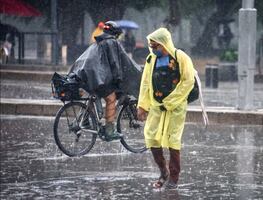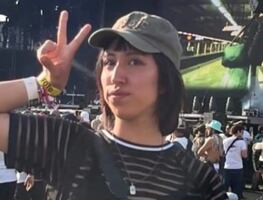Más Información

Él es Roberto Blanco Cantú, "El Señor de los Buques", ligado al tráfico de huachicol a través de Mefra Fletes; continúa prófugo

Embajada de EU alerta por falsa ruta migrante en TikTok para llegar a Los Ángeles; señala a "Los Trejos de Nuevo Laredo"

Buscadoras, académicos, morenistas y excomisionados... estos son los 27 perfiles que buscan encabezar la Comisión Nacional de Búsqueda

Reforma a Ley Aduanera llega a San Lázaro; van por restablecer aranceles a importación de mercancías

Frente frío 3 y ciclón "Mario" provocarán lluvias desde este miércoles hasta el sábado; estos son los estados afectados

Tras la detención de la viuda e hija de "El Ojos", ¿quiénes son los más buscados en CDMX? La FGJ ofrece recompensa
Griselda Triana
cries over becoming one of the victims to whom her husband, the Mexican journalist Javier Valdez , gave voice in his chronicles. "When I read his latest book, Narco-journalism , I saw myself reflected in it and I rejected it. He told me that he was not going to die because someone had to tell those stories."
The widow of Valdez, killed on May 15 in Culiacán , traveled to Spain to receive the posthumous prize that the Madrid Press Association gave today to her husband on account of his defense of the profession and the right to inform . Sitting in front of a sign which read "Javier Valdez lives," Triana shed some tears for both the memories and what lies ahead: "On Sunday was Father's Day. My two children could not get up and sing Las Mañanitas to Javier or invite him over breakfast."
Triana did not only mourned her husband's disappearance, she also denounced the impunity enjoyed by the murderers of journalists in Mexico and wished that those responsible for Valdez's death would not remain unpunished.
"The progress in the case is really null, minimal. I would like to believe that the government and justice department are effectively doing their job and that international pressure will be useful. But that does not guarantee anything," she told to EL UNIVERSAL . Triana, who met Valdez 30 years ago and worked in the press with him, said that despite the dangers, she could never ask her husband to stop writing, "because it was what he wanted to do, and because critical journalists are much needed ."
Before a group of Spanish journalists who went to the Press Association, Triana denounced the tragedy that does not stop in Mexico: the organized crime that is now owner of entire municipalities, corrupting institutions and breaking down the social fabric.
Triana claimed that to portray this, brave pens are needed, such as was Valdez's. "I do want to believe that there is a before and after the death of Javier and the demonstrations that followed. The “after” belongs to those who stay, yourselves, and you must demand that there is security to exercise responsible journalism ," she said to the Mexican press and society.
mr







